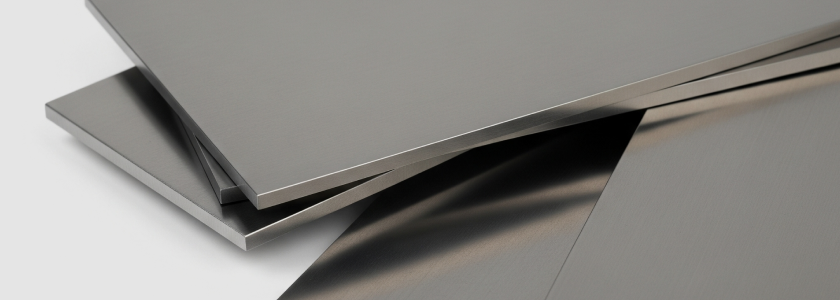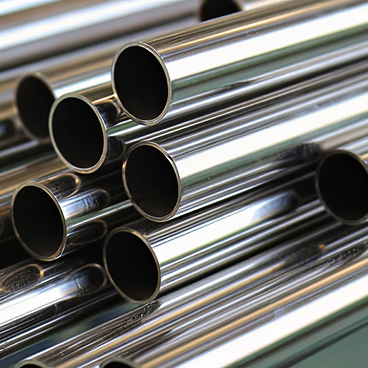

Titanium Plates from Om Steel are the preferred choice for industries seeking high-quality metal plates with exceptional strength, lightweight properties, and outstanding corrosion resistance. As a trusted provider of top-grade metal products, we offer a comprehensive range of titanium plates designed to meet diverse industry needs.
Our titanium plates are meticulously crafted using premium-grade titanium and advanced manufacturing techniques to ensure superior performance and durability. Titanium is widely recognized for its remarkable strength-to-weight ratio, making it an ideal material for applications where weight reduction is critical without compromising structural integrity.
Om Steel provides titanium plates in various grades, sizes, and thicknesses to cater to different applications. Whether you require plates for aerospace, automotive, medical, or industrial purposes, our wide selection ensures that you find the perfect solution for your specific requirements.
With their exceptional corrosion resistance, titanium plates offer long-lasting performance in challenging environments, including marine, chemical, and offshore applications. They can withstand extreme temperatures, making them suitable for high-temperature environments where other materials may falter.
At Om Steel, we prioritize quality and customer satisfaction. Our titanium plates undergo rigorous testing and quality control procedures to ensure they meet or exceed industry standards. Our experienced team is ready to assist you in selecting the right grade and size of titanium plates to meet your specific needs.
Cold Rolling Titanium Plates Vs Hot Rolling Titanium Plates
Cold Rolling Titanium Plates
Cold rolling of titanium plates involves passing the metal through a set of rollers at room temperature. This process offers different advantages. Cold rolling results in a smoother surface finish, with tighter dimensional tolerances and improved flatness. It also increases the yield strength and hardness of the titanium, making it suitable for applications that require high strength. Additionally, cold-rolled titanium plates exhibit excellent surface uniformity and can be easily formed and fabricated.
Hot Rolling Titanium Plates
Types of Titanium Plates
Commercially Pure Titanium Plates
Titanium Alloy Plates
High-Strength Titanium Plates
Titanium Clad Plates
Customized Titanium Plates
In addition to standard types, titanium plates can also be custom-made to meet specific requirements. This includes plates with specialized dimensions, thicknesses, or surface finishes to suit unique applications.
Titanium Tubes
Specifications
| Specification | ASTM B 337, ASME SB 337 / ASTM B 338, ASME SB 338 |
| Dimensions | ASTM, ASME and API |
| Pipe Size | ½” NB to 24” NB in Sch 10s, 40s, 80s, 160s, XXS |
| Tube Size | 6 mm OD x 0.7 mm to 50.8 mm OD x 3 mm thk |
| Schedule | SCH20, SCH30, SCH40, SCH60, SCH80, SCH120, SCH140, SCH160, STD, XS, XXS |
| Type | Seamless / Welded / ERW / Fabricated |
| Form | Round, Square, Rectangular, Hydraulic, Etc. |
| Length | Single Random, Double Random & Cut Length |
| End | Plain End, Beveled End, Threaded |
Titanium Tubes
Weight
| Nominal Pipe Size (in) | Outside Diameter (in) | Inside Diameter (in) | Wall Thickness (in) | Weight per ft (lbs/ft) | Internal Surface Area per ft² (ft²) | Max Internal Pressure @100°F (psi) |
|---|---|---|---|---|---|---|
| 1/2 | 0.840 | 0.710 | 0.065 | 0.31 | 0.19 | 2062 |
| 3/4 | 1.050 | 0.920 | 0.065 | 0.41 | 0.24 | 1624 |
| 1 | 1.315 | 1.185 | 0.065 | 0.54 | 0.31 | 1280 |
| 1-1/4 | 1.660 | 1.530 | 0.065 | 0.69 | 0.40 | 1047 |
| 1-1/2 | 1.900 | 1.770 | 0.065 | 0.79 | 0.46 | 913 |
| 2 | 2.375 | 2.245 | 0.065 | 0.95 | 0.59 | 693 |
| 2-1/2 | 2.875 | 2.745 | 0.065 | 1.16 | 0.72 | 602 |
| 3 | 3.500 | 3.370 | 0.065 | 1.42 | 0.88 | 597 |
| 3-1/2 | 4.000 | 3.870 | 0.065 | 1.63 | 1.01 | 539 |
| 4 | 4.500 | 4.370 | 0.065 | 1.84 | 1.14 | 486 |
| 5 | 5.563 | 5.433 | 0.065 | 2.28 | 1.41 | 394 |
| 6 | 6.625 | 6.495 | 0.065 | 2.73 | 1.69 | 336 |
| 8 | 8.625 | 8.495 | 0.065 | 3.56 | 2.21 | 263 |
| 10 | 10.750 | 10.620 | 0.065 | 4.44 | 2.76 | 211 |
| 12 | 12.750 | 12.620 | 0.065 | 5.26 | 3.29 | 180 |
| 14 | 14.000 | 13.870 | 0.065 | 5.78 | 3.62 | 163 |
| 16 | 16.000 | 15.870 | 0.065 | 6.63 | 4.15 | 143 |
| 18 | 18.000 | 17.870 | 0.065 | 7.45 | 4.68 | 127 |
| 20 | 20.000 | 19.870 | 0.065 | 8.29 | 5.21 | 115 |
| 24 | 24.000 | 23.870 | 0.065 | 9.98 | 6.26 | 99 |
| 30 | 30.000 | 29.870 | 0.065 | 12.44 | 7.81 | 81 |
| 36 | 36.000 | 35.870 | 0.065 | 14.91 | 9.36 | 68 |
| 42 | 42.000 | 41.870 | 0.065 | 17.37 | 10.90 | 58 |
| 48 | 48.000 | 47.870 | 0.065 | 19.83 | 12.45 | 51 |
| Nominal Pipe Size (in) | Inside Diameter (in) | Wall Thickness (in) | Weight per ft (lbs/ft) | Internal Surface Area per ft² (ft²) | Max Internal Pressure @100°F (psi) |
|---|---|---|---|---|---|
| 1/2 | 0.674 | 0.083 | 0.39 | 0.18 | 2062 |
| 3/4 | 0.804 | 0.083 | 0.49 | 0.21 | 1839 |
| 1 | 1.049 | 0.109 | 0.84 | 0.29 | 1729 |
| 1-1/4 | 1.380 | 0.109 | 1.13 | 0.38 | 1416 |
| 1-1/2 | 1.610 | 0.109 | 1.33 | 0.45 | 1224 |
| 2 | 2.067 | 0.109 | 1.73 | 0.58 | 1002 |
| 2-1/2 | 2.469 | 0.120 | 2.40 | 0.71 | 968 |
| 3 | 3.068 | 0.120 | 3.01 | 0.89 | 861 |
| 3-1/2 | 3.548 | 0.120 | 3.49 | 1.04 | 766 |
| 4 | 4.026 | 0.120 | 3.96 | 1.18 | 675 |
| 5 | 5.047 | 0.120 | 4.97 | 1.47 | 546 |
| 6 | 6.065 | 0.134 | 6.37 | 1.76 | 508 |
| 8 | 7.981 | 0.148 | 8.46 | 2.32 | 429 |
| 10 | 10.020 | 0.165 | 11.13 | 2.92 | 376 |
| 12 | 11.938 | 0.180 | 13.35 | 3.48 | 343 |
| 14 | 13.876 | 0.188 | 15.50 | 4.04 | 319 |
| 16 | 15.938 | 0.188 | 17.80 | 4.63 | 298 |
| 18 | 17.926 | 0.188 | 20.02 | 5.21 | 280 |
| 20 | 19.938 | 0.218 | 23.60 | 5.81 | 263 |
| 24 | 23.938 | 0.250 | 30.05 | 7.01 | 235 |
| 30 | 29.875 | 0.312 | 45.14 | 8.76 | 191 |
| 36 | 35.875 | 0.375 | 64.14 | 10.51 | 152 |
| 42 | 41.875 | 0.375 | 73.36 | 11.48 | 173 |
| 48 | 47.375 | 0.313 | 91.57 | 12.40 | 217 |
Titanium Plates
Thickness
| Thickness (in inches) | Titanium Sheet Grades |
|---|---|
| .016 | CP1, A70, 75A, CP3, A40, 55A, 6AL-4V ANN |
| .020 | CP1, A70, 75A, CP3, A40, 55A, 6AL-4V ANN |
| .025 | CP1, A70, 75A, CP3, A40, 55A, 6AL-4V ANN |
| .032 | CP1, A70, 75A, CP3, A40, 55A, 6AL-4V ANN |
| .040 | CP1, A70, 75A, CP3, A40, 55A, 6AL-4V ANN |
| .050 | CP1, A70, 75A, CP3, A40, 55A, 6AL-4V ANN |
| .063 | CP1, A70, 75A, CP3, A40, 55A, 6AL-4V ANN |
| .071 | CP1, A70, 75A, CP3, A40, 55A, 6AL-4V ANN |
| .080 | CP1, A70, 75A, CP3, A40, 55A, 6AL-4V ANN |
| .090 | CP1, A70, 75A, CP3, A40, 55A, 6AL-4V ANN |
| .100 | CP1, A70, 75A, CP3, A40, 55A, 6AL-4V ANN |
| .125 | CP1, A70, 75A, CP3, A40, 55A, 6AL-4V ANN |
Titanium Tubes
Pressure Rating
| Tube O.D. (in.) | .028 in | .035 in | .049 in | .065 in | .083 in | .095 in | .109 in | .120 in |
|---|---|---|---|---|---|---|---|---|
| 1/8 | 7900 | 10100 | ||||||
| 1/4 | 3700 | 4800 | 7000 | 9500 | ||||
| 5/16 | 3700 | 5400 | 7300 | |||||
| 3/8 | 3100 | 4400 | 6100 | |||||
| 1/2 | 2300 | 3200 | 4400 | |||||
| 3/4 | 2200 | 3000 | 4000 | 4600 | ||||
| 1 | 2200 | 2900 | 3400 | 3900 | 4300 |
Titanium tubes
size
| Property | Specification |
|---|---|
| Outer Diameter | 0.5 mm – 330 mm |
| Thickness | 0.4 mm – 10 mm |
| Length | Max 15 m |
| Manufacturing Standards | ASTM B338, ASTM B861, DIN 17 861 |
Titanium Welded
Tubes & Seamless Tubing Surface Finish
| Surface Finish | Internal Surface (ID) | External Surface (OD) | ||
|---|---|---|---|---|
| Roughness Average (RA) μ inch | Roughness Average (RA) μm | Roughness Average (RA) μ inch | Roughness Average (RA) μm | |
| AP (Annealed & Pickled) |
Not defined | Not defined | 40 or Not defined | 1.0 or Not defined |
| BA (Bright Annealed) |
40, 32, 25, 20 | 1.0, 0.8, 0.6, 0.5 | 32 | 0.8 |
| MP (Mechanical Polish) |
40, 32, 25, 20 | 1.0, 0.8, 0.6, 0.5 | 32 | 0.8 |
| EP (Electro Polish) |
15, 10, 7, 5 | 0.38, 0.25, 0.20, 0.13 | 32 | 0.8 |
Application Industry
Serving Diverse Sectors with Precision & Performance
Om Steel supplies premium steel and alloy products to a wide range of industries, ensuring strength, durability, and performance in every application. From construction, oil & gas, and automotive to power plants, shipbuilding, and chemical processing — our materials meet the demands of critical operations. Trusted by industry leaders, we deliver solutions that stand up to the toughest challenges.
Defence & Aerospace
Oil/Gas
Speciality Valves & Vacuum
Precision Components
Defence & Aerospace
Oil/Gas
Speciality Valves & Vacuum
Precision Components
Explore Our
Continue Reading on Similar Topics
Ask Anything
Do you have any questions?






